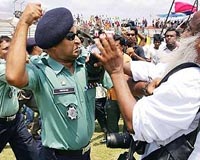| . |  |
. |
Washington (AFP) Dec 14, 2009 US Secretary of State Hillary Clinton on Monday outlined a pragmatic stance on human rights in China and Russia, saying it is sometimes better to raise problems with them "behind closed doors." The chief US diplomat's speech sparked concern from leading human rights group Amnesty International, even as her spokesman urged China publicly to immediately release Chinese dissident Liu Xiaobo. "Principled pragmatism informs our approach on human rights, informs our approach with all countries but particularly with key countries like China and Russia," she said in unveiling the Obama administration's human rights agenda. US cooperation with Moscow and Beijing is "critical" to efforts to revive the global economy, halt the nuclear ambitions of Iran and North Korea, check the spread of dangerous weapons, and tackle climate change, Clinton said. "In China, we call for protection of rights of minorities in Tibet and Xinjiang," the chief US diplomat said. The United States also pushes for the right of people in China to "express oneself and worship freely" as well as for civil society and religious groups to advance their causes within a legal framework, she added. "With Russia we deplore the murders of journalists and activists and support the courageous individuals who advocate at great peril for democracy," Clinton said. "With China, Russia, and others, we are engaging on issues of mutual interest while also engaging societal actors in these same countries who are working to advance human rights and democracy," she said. Even though she promised the United States would have "candid conversations" with Beijing and Moscow, she suggested other countries would be more likely to be subjected to public exposure. "Sometimes, we will have the most impact by publicly denouncing a government action, like the coup in Honduras or violence in Guinea," Clinton said. "Other times, we will be more likely to help the oppressed by engaging in tough negotiations behind closed doors, like pressing China and Russia as part of our broader agenda," Clinton said. "In every instance, our aim will be to make a difference, not to prove a point," she said. T. Kumar, Amnesty USA's advocacy director for Asia and the Pacific, said his organization welcomed Clinton's human rights speech, but added it was also "taken aback" with the low-profile approach. "We want to ensure that closed-door negotiations are complemented by public pressure," Kumar told AFP. "The two countries she picked for behind the closed-doors negotiations are the two countries which happen to be powerful countries," he said. If Washington doesn't stand up to them, nobody else will, he warned. He said he wants administration officials to continue to make public statements on human rights like those President Barack Obama made in China last month. Traveling to China in February, Clinton angered human rights activists when she vowed not to let human rights block progress on the global economic crisis, climate change and security. But Kumar said Clinton "corrected that statement" by saying all are important. He also welcomed the fact that Clinton's spokesman Ian Kelly called for the immediate release of Chinese dissident Liu Xiaobo, saying he may have been harassed and detained for exercising his right to freedom of expression. The dissident's family and a rights group said Saturday that Liu, one year after he was detained in the wake of signing a pro-democracy charter, had been formally indicted for subversion. The 53-year-old writer, who was involved in the 1989 Tiananmen pro-democracy protests, was arrested last December after signing Charter 08, a widely circulated petition that called for greater democracy in China.
Share This Article With Planet Earth
Related Links Democracy in the 21st century at TerraDaily.com
 'Dire' Bangladesh policing threatens democracy: think-tank
'Dire' Bangladesh policing threatens democracy: think-tankDhaka (AFP) Dec 14, 2009 Bangladesh's police force is in such a "dire state" that it risks inviting a military takeover of law and order duties, an international research institute has warned. The Brussels-based International Crisis Group (ICG) said in a report published over the weekend that Prime Minister Sheikh Hasina's government lacked the political will to reform the police force despite a UN-led effort to do ... read more |
|
| The content herein, unless otherwise known to be public domain, are Copyright 1995-2009 - SpaceDaily. AFP and UPI Wire Stories are copyright Agence France-Presse and United Press International. ESA Portal Reports are copyright European Space Agency. All NASA sourced material is public domain. Additional copyrights may apply in whole or part to other bona fide parties. Advertising does not imply endorsement,agreement or approval of any opinions, statements or information provided by SpaceDaily on any Web page published or hosted by SpaceDaily. Privacy Statement |